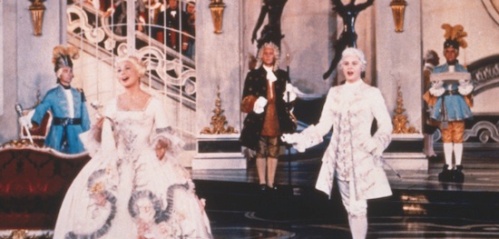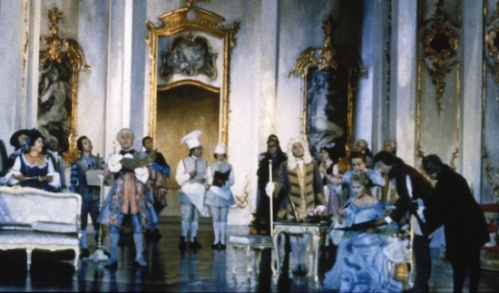
Inspired by the recent DVD and Blu-ray release of Paul Czinner’s 1962 adaptation of Strauss’ Der Rosenkavalier, Derek Clark, Head of Music at Scottish Opera, looks at how the filmmakers went about adapting stage performances for the big screen.
This is an absolute treat; a live performance of Strauss’ best-loved opera from the Salzburg Festival conducted by Herbert von Karajan and featuring some of the finest singers of the day, in a production (by Rudolph Hartmann) faithful to the spirit of the piece with sumptuous sets and costumes which match the opulence of the score, played with great elan and polish by an orchestra at the peak of its form.
Sung in the original German, the film is subtitled and the recorded sound is very good, considering the age of the film, with plenty of orchestral detail, though the singers are never overwhelmed.
Sometimes, though, the recording levels seem to have been evened out, resulting in a certain similarity of volume, but this is a small price to pay in view of the quality of the overall performance. In particular it is good to see Elisabeth Schwarzkopf performing the Marschallin, her singing more natural and less mannered than in the famous studio recording she made with Karajan in the late 1950’s.
The Ochs from that recording, Otto Edelmann, also sings here, and his larger than life portrayal of the role is a real tour de force, complete with thick Viennese accent, which only rarely interferes with his singing.
The Octavian is Sena Jurinac, who made the role very much her own in the 1950s and it is good to have her interpretation preserved, even though she looks very feminine throughout. Her vocal partnership with the Sophie of Anneliese Rothenberger, another artist experienced in her role, is one of the musical highlights of the performance.

One of the impressive sets from Der Rosenkavalier
With all the subsidiary roles well-sung (particularly the Italian tenor in Act 1) there are no weak links in the casting and the whole performance makes light of the immense difficulty of much of the music. The production is ‘traditional’ in the best sense of that word.
Some of the more intimate scenes seem a little lost on the vast expanses of the Festspielhaus stage, and present-day audiences may find it a little static and superficial. The Marschallin’s lovemaking with Octavian, for example, so graphically depicted in the music, is extremely demure, but this is a matter of changing tastes, and it certainly never gets in the way of the music.
More modern productions tend to get closer to the characters’ emotional cores, but production values nowadays are different. Although the humour of the piece is not neglected (Strauss called it ‘a comedy for music’ after all) there is a marked lack of audience reaction throughout, though they applaud generously enough at the end of each act, and maybe for repeated listening and viewing, it’s not a bad idea that you can concentrate on the music without any distracting laughter.
Perhaps Karajan’s unsmiling demeanour as he enters to conduct each act put a damper on the audience’s natural enthusiasm, but though nowadays we might expect a more unbending and ‘human’, not to say humorous, approach to this opera, there is no denying his mastery and understanding of the score.
The film is above all a testament to him and the standards he was able to achieve, and should be seen by every lover of this fascinating opera.
Der Rosenkavalier is now available on DVD and Blu-ray from Amazon.co.uk.
Derek Clark was born in Glasgow and studied at the RSAMD and Durham University. He began his career at Welsh National Opera, but since 1997 has been Head of Music at Scottish Opera where he has conducted a wide variety of repertoire from Handel to James MacMillan. He is also active as a coach, accompanist and composer/arranger, and was Assistant Conductor on David McVicar’s production of ‘Der Rosenkavalier’ for Scottish Opera. He is currently conducting Rory Bremner’s new version of ‘Orpheus in the Underworld’.

